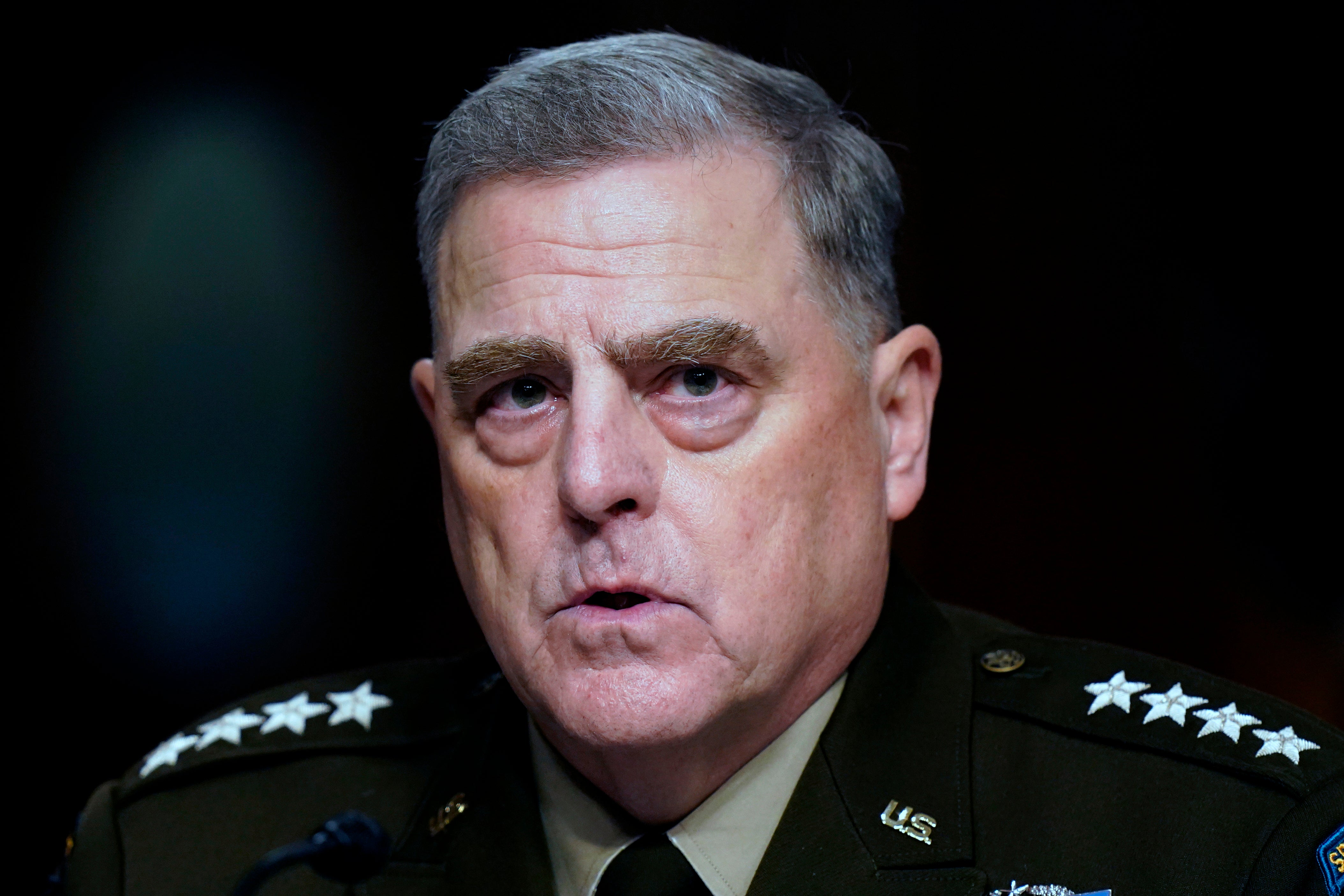‘Why haven’t you resigned?’ Tom Cotton asks Gen Milley over US withdrawal from Afghanistan
‘Resigning is a really serious thing,’ Milley argues

Your support helps us to tell the story
From reproductive rights to climate change to Big Tech, The Independent is on the ground when the story is developing. Whether it's investigating the financials of Elon Musk's pro-Trump PAC or producing our latest documentary, 'The A Word', which shines a light on the American women fighting for reproductive rights, we know how important it is to parse out the facts from the messaging.
At such a critical moment in US history, we need reporters on the ground. Your donation allows us to keep sending journalists to speak to both sides of the story.
The Independent is trusted by Americans across the entire political spectrum. And unlike many other quality news outlets, we choose not to lock Americans out of our reporting and analysis with paywalls. We believe quality journalism should be available to everyone, paid for by those who can afford it.
Your support makes all the difference.US Military officials defended the United States’ withdrawal from Afghanistan as Senators asked them about the advice they gave President Joe Biden and whether they thought that advice was heard.
Republicans on the Senate Armed Services Committee asked Gen Mark Milley, who is chairman of the Joint Chiefs of Staff, and US Central Command leader Gen Frank McKenzie about his previous assessment that the United States should have kept 2,500 troops in Afghanistan.
Senator Tom Cotton of Arkansas, who served in Afghanistan, asked Gen Milley why he did not resign since he was only consulted on 25 August after the government in Kabul collapsed on 15 August.
“Resigning is a really serious thing, it’s a political act, resigning in protest,” Gen Milley said, adding that his job is to provide military advice but that the president doesn’t need to follow it.
“It would be an incredible act of political defiance for a commissioned officer to just resign because my advice wasn’t taken. This country doesn’t want generals figuring what orders we’re going to accept and do or not,” he said.
Elsewhere, Senator Jack Reed, the Democratic chairman of the Senate Armed Services Committee, said it was important to not only look at the actions of the last month but also the two decades of the United States’ engagement in Afghanistan.
“The path that led to this moment was paved with years of mistakes, from our catastrophic pivot to Iraq, to our failure to handle Pakistan’s support for the Taliban, to the flawed Doha agreement signed by President Trump,” Mr Reed said, referring to the former president’s agreement with the Taliban.
Mr Reed asked Gen Milley, as well as Defense Secretary Lloyd Austin and US Central Command leader Gen Kenneth McKenzie if the former president’s agreement had an effect on the morale of forces.
“It did negatively affect the performance of the Afghan forces,” Gen McKenzie said.
Mr Austin, a retired US Army general who led forces in Afghanistan, said he felt President Joe Biden heard the advice of his military advisers.
“I always keep my advice to the president confidential but I am very much satisfied that we had a thorough policy review and I believe that all of the parties had an opportunity to provide input and that input was received,” he said.
Democratic Sen Kirsten Gillibrand of New York asked Gen Milley about what he considered were important lessons that needed to be learned.
“I think that one error we may have made over time as you made them too dependent on technology too dependent on our capabilities,” Gen Milley said. “We didn't take in the cultural aspects perhaps as much as we should have, and we mirror imaged.”
Sen Richard Blumenthal, a Democrat from Connecticut, said he was involved in an effort to charter planes to get people out of the country and was frustrated by the process.
“We need an evacuation czar, someone who will provide a plan,” he said, saying he was angry officials didn’t know how many Americans remained in Afghanistan. “We don’t have an estimate on the number because nobody is in charge over there.”
Senators also mentioned the bungled airstrike that led to the deaths of seven civilian children and an aid worker, along with another adult.
“Have you reached out to the aircrew to make sure they know it's not their fault there are seven dead children,” Senator Kevin Cramer, a Republican from North Dakota, to which Mr Austin replied: “I have not, sir”.



Join our commenting forum
Join thought-provoking conversations, follow other Independent readers and see their replies
Comments